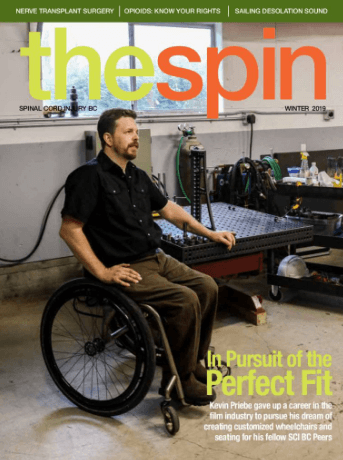
SURVEY REVEALS AUTONOMIC DYSREFLEXIA PROVOKED BY BOWEL CARE TO BE PARTICULARLY PROBLEMATIC
Dr. Victoria Claydon has long been intrigued by how SCI disrupts cardiovascular function. As an ICORD scientist and Professor in the Department of Biomedical Physiology and Kinesiology at Simon Fraser University, much of her work focuses on autonomic dysreflexia, or AD, the dangerous increase in blood pressure that’s a reality for many of our readers.
In 2018, two of her grad students—VeraEllen Lucci and Jessica Inskip—conducted a survey about bowel care. The key findings: bowel care was a key factor that impacted quality of life, and for many, AD provoked by bowel care was particularly problematic.
“There were hints from a previous study that anaesthetic lubricants, like those containing lidocaine, might improve AD during in-hospital, nurse-led bowel care by blocking the sensory stimulus that triggers the high blood pressure,” says Claydon.
They decided to test this in a real-world community setting— hopeful that lidocaine would be an effective means to minimize AD for affected individuals.
13 PARTICIPANTS WITH HIGH-LEVEL INJURIES, A HISTORY OF AD, AND A CONSISTENT BOWEL PROGRAM ARE CAREFULLY MONITORED DURING REAL-WORLD STUDY
The team designed a study, and worked with SCI BC and ICORD to recruit participants.
“Partnership with SCI BC was critical for this work—the nature of the research is inherently personal and having links with a trusted organization like SCI BC was important to help our participants feel comfortable,” says Claydon.
13 people with high level injuries, a history of AD, and a consistent bowel program took part in the study. They completed their bowel care in the same way on two days, in the setting of their choice, while the researchers measured their blood pressure and heartbeat. On one day, they were randomly chosen to use the medicated lidocaine lubricant, and on the other day they used a placebo lubricant that looked identical but didn’t contain any medication.
In addition to monitoring blood pressure and heart beat, the researchers measured the length of time it took to complete bowel care on each day.


WHEN TESTING WAS COMPLETE AND RESULTS COMPARED, RESEARCHERS WERE SURPRISED TO FIND LIDOCAINE WAS PROBABLY DOING MORE HARM THAN GOOD.
When using the lidocaine lubricant:
- bowel care took about 20 minutes longer to complete than with the placebo lubricant.
- the lidocaine lubricant clearly resulted in elevated AD levels.
- participants blood pressure rose to a higher level, and stayed elevated for longer, with the lidocaine lubricant.
- there were more arrhythmia incidents with the lidocaine lubricant.
Many felt as though their bowel care was worse on the day they used the lidocaine lubricant—with bowel movements taking longer to initiate, bowel care taking longer than usual, and being more difficult.
“Prior to the testing, we did consider that lidocaine might impair reflex bowel emptying,” says Claydon, “However, we always expected lidocaine would improve AD—we certainly didn’t expect it to make the severity of AD worse and exacerbate the cardiac problems.”
Claydon and her team suspect the lidocaine lubricant impairs reflex defecation by blocking the sensory signals (like digital stimulation or suppository use) that are typically used to initiate a bowel movement by people with SCI.
“We think this more difficult, and longer bowel care increases the trigger for and duration of AD, resulting in blood pressure rising to higher levels for longer periods of time, and provoking irregular heartbeats,” says Claydon.

RESEARCHERS DECIDE TO SUGGEST GUIDELINES BE RECONSIDERED
They decided to suggest the guidelines be reconsidered based on a number of reasons. First, theirs was the only study that looked at the real-life experiences of individuals with SCI when using lidocaine during their typical at-home care; all three previous studies were in the hospital or performed by a nurse. Second, though the sample size was small, Claydon says it was the right sample.
“We tested individuals most likely to use lidocaine to help manage AD during bowel care,” says Claydon, “Accordingly, our data better reflects the realities of bowel care for the target population.”
Third, the team was careful to measure the true severity of AD elicited during bowel care by measuring blood pressure continuously throughout participants’ bowel program. Additionally, no other studies examined the impact of lidocaine on the time to complete bowel care, nor did they study cardiac function.
CLAYDON AND COLLEAGUES WILL NOW FOCUS ON MAKING SURE RESULTS OF THE STUDY ARE WIDELY PUBLICIZED SO PRACTICES CHANGE.
The team’s results with even a small sample were so significant that failing to question existing practice would be unethical, as would expanding testing to include more participants.
“In our case, we didn’t feel it was ethically responsible to continue testing more people when we already had compelling evidence that the lidocaine intervention was making things so much worse—we would be exposing these new participants to the intervention with little expectation of benefit, and perhaps some risk to them given that we now knew that the lidocaine wasn’t working,” says Claydon. “So, for ethical reasons as well as scientific ones, we stopped the trial and questioned the recommendations for use of lidocaine during at-home bowel care.”
Claydon and her colleagues will now focus on making sure that the results are widely publicized so that people with SCI, along with clinicians and caregivers, can change their practices.
Claydon also acknowledges that this research offers an important cautionary tale for her and other researchers.
“When conducting scientific research, we need to be aware that results in a controlled laboratory setting may not always equate in a predictable way to responses in real life, and it’s vital to work with individuals with SCI to examine how clinical interventions work for them in the real world,” she concludes.
The research was funded by the Craig H Neilsen Foundation and ICORD. The results were published last month in the journal Spinal Cord.
This full article originally appeared in the Winter 2019 issue of The Spin. Read the full version alongside other stories, including:
- Nerve Transplant Surgery
- Opioids: Know Your Rights
- Sailing Desolation Sound
- And more!
Read the full Winter 2019 Issue of The Spin online!




